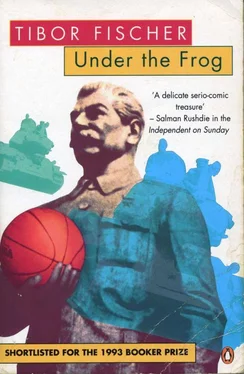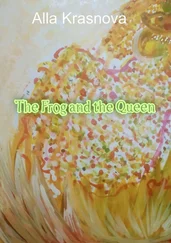Tibor Fischer - Under the Frog
Здесь есть возможность читать онлайн «Tibor Fischer - Under the Frog» весь текст электронной книги совершенно бесплатно (целиком полную версию без сокращений). В некоторых случаях можно слушать аудио, скачать через торрент в формате fb2 и присутствует краткое содержание. Жанр: Современная проза, на английском языке. Описание произведения, (предисловие) а так же отзывы посетителей доступны на портале библиотеки ЛибКат.
- Название:Under the Frog
- Автор:
- Жанр:
- Год:неизвестен
- ISBN:нет данных
- Рейтинг книги:3 / 5. Голосов: 1
-
Избранное:Добавить в избранное
- Отзывы:
-
Ваша оценка:
- 60
- 1
- 2
- 3
- 4
- 5
Under the Frog: краткое содержание, описание и аннотация
Предлагаем к чтению аннотацию, описание, краткое содержание или предисловие (зависит от того, что написал сам автор книги «Under the Frog»). Если вы не нашли необходимую информацию о книге — напишите в комментариях, мы постараемся отыскать её.
Shortlisted for Booker Prize 1993
Set in post-war Hungary between 1944 and 1956, this ferociously funny and bitterly sad story follows the fortunes of two young men in the pursuit of sex and the avoidance of work and army service. They survive the chaos of communism by becoming part of a travelling basketball team.
Under the Frog — читать онлайн бесплатно полную книгу (весь текст) целиком
Ниже представлен текст книги, разбитый по страницам. Система сохранения места последней прочитанной страницы, позволяет с удобством читать онлайн бесплатно книгу «Under the Frog», без необходимости каждый раз заново искать на чём Вы остановились. Поставьте закладку, и сможете в любой момент перейти на страницу, на которой закончили чтение.
Интервал:
Закладка:
With remarkable speed and ease, perhaps because of a good word from Nigel, perhaps because of the informality of the times, Gyuri was shown in to see the Ambassador, who received the file with courtesy. He puffed on his pipe, manifestly at home in the revolution and pored over the first few pages. ‘Ah. Dawson. Yes,’ he thought out loud.
‘Thank you very much, Mr Fischer. It’s very kind of you to bring this round.’ It took fifty seconds; Gyuri was out almost as fast as he had got in. He hadn’t been expecting anything in particular, though some gold bullion, a British passport, a job offer, something like that would have been quite acceptable. A little excitement and incredulity as a minimum. The Ambassador showed him out as if he had just return a stray button from the Ambassador’s overcoat.
In the waiting-room, next to the entrance, Nigel was chatting with a man whom Gyuri had met before, The Times correspondent. Gyuri had been excited to meet him because The Times was The Times, and also because everyone knew that their foreign correspondents worked for British Intelligence, although the correspondent did a good job of disguising it. In fact his behaviour was rather dim. Brilliant cover. Gyuri admired professionalism. There was also a broad, military figure who looked as if he would be happiest inspecting rifles, who sure enough, was introduced to Gyuri as the military attaché.
‘What do you make of the new government?’ asked The Times, presumably looking for some good quote.
‘It’s fine. I approve of it, while it lasts.’
‘What do you mean?’
‘The Russians will be back.’
There was gentle British scoffing at this statement. In the few days he had been dealing with live Brits, Gyuri had rapidly become attuned to how the British had reached a level of civilisation where they could clearly tell you how stupid you were, without actually having to say so; that’s what cricket and centuries of parliamentary democracy could do for you.
‘The Russians have given an undertaking to leave. I saw Mikoyan in the parliament with my own eyes, the man was in tears over losing Hungary,’ explained the correspondent. ‘They’re leaving. They have no choice.’
Gyuri had had the same argument that morning with Elek who was cock-a-hoop over the news. ‘I told you this couldn’t go on much longer,’ Elek had said. Gyuri summoned up a simplified, profanity-free version of his thesis for British consumption.’I know the Russians have lost one fight. They are leaving. But I do not believe they will say: “Oh. You want to be independent. We’re so sorry we didn’t understand that you didn’t want us here.” They will return.’
There was more quivering of stiff upper lips in amusement at the wary Hungarian who had no grasp of the international situation. ‘No,’ pronounced the military attaché, ‘they’re finished here.’
‘Indeed,’ said The Times, ‘I’m willing to bet you five pounds that they don’t come back. You can give me a few Hungarian lessons when I win.’
‘I hope you do win,’ said Gyuri.
Jadwiga had told Gyuri to meet her at the Corvin and going there he stopped on the Körút to buy a newspaper. A Soviet corpse was still lying there, an unusual sight now, since the dead had been mostly packed away out of sight. Something metallic glinted on his wrist. It looked familiar: an Omega watch, like the one the Red Army had relieved him of back in ’44, exactly the same model. He undid the strap, and looked on the back of the watch. There were the initials Gy. R ‘Thanks very much for looking after it,’ he said, pocketing the watch.
Walking across to the newsagent, a shout stopped him. It was Róka. ‘Hey class alien! This is what you want,’ he said, handing Gyuri one of the stack of papers he was nursing. ‘Kill anyone interesting?’ he enquired. ‘Not really,’ Gyuri replied, ‘but I was being choosy.’ Róka had spent most of the livefire time chasing a lorryload of AVO who were keen on surprise atrocities; they would flip open the flaps on the lorry’s rear and blast away at anyone in view, male or female, young or old, unarmed or unarmed. Róka’s crew had missed them several times by seconds. The story ended with the AVO being last seen motoring in the direction of the Angyalföld. ‘They couldn’t have lasted more than ten minutes,’ Róka obituarised. The paper that Róka had handed over was entitled The Truth. ‘I’m working on the editorial committee,’ he explained proudly. ‘Oh, before I forget, Hepp wants everyone out at the club at Hepp-time, Monday morning. He says we’ve wasted enough time.’ With a parting injunction to look up Gyurkovics, who had managed to get himself put in charge of the distribution of a vast amount of processed cheese from Switzerland, Róka carried on down the street dishing out his journal to anyone willing to take it.
Gyuri had never thought he would ever in his life earnestly want to read a Hungarian newspaper. Newspapers were now teeming with the sort of increases that could normally only be found in the production figures of Communist enterprises.
The old papers had changed, they had received editorial transplants and new ones were springing up like mushrooms. They weren’t much good but you did have the novel sensation of wanting to read what they had to say. You couldn’t tell before you read the paper what would be in it; now you got all those things that hadn’t been there for nearly ten years, opinions that weren’t the Party’s. Casting his eye over The Truth, Gyuri read some soggy new poetry, some exhausted old poetry and some articles about the 23rd which hardly counted as news. It was still a pleasure to read.
After the fighting, the tidying up. Everywhere, shattered glass, masonry and martial litter was being victoriously swept up by the city-proud populace. Soviet wreckage was being pushed out of roads so that traffic could circulate properly. Everyone was on their best behaviour as if the Revolution was an honoured guest they wanted to impress with their hospitality and civility. A bubble of decency had risen out of the earth’s core and burst in Budapest. Peasants were driving in from the countryside with their carts to distribute food to whoever they came across, dishing out sacks of potatoes, apples, marrows, some late melons. In a broken jewellers’ window Gyuri saw a note explaining that the contents had been taken to the flat above for safe-keeping. There were cardboard boxes on pavements marked ‘for the fallen’, overflowing with banknotes contributed for the dependents of the dead.
The worst fighting or the best fighting depending on how you felt about it had all been around the Corvin Cinema. The Corvin Cinema was not a very salubrious or comfortable cinema, as a cinema it wasn’t much to brag about, but as if with astonishing forethought, it couldn’t have been better designed for street fighting. The circular cinema was surrounded by a ring of flats with lots of convenient alleyways in and out.
But the Corvin had not been the only streetfighting club. All over Budapest they had jack-in-the-boxed. Even around the Corvin, there had been stiff competition: the Prater utca school, just behind the Corvin, and, just across the road, on the other side of the Űllői út, the Kilián Barracks, the home of a ‘C’ battalion, a collection of soldiers considered by the authorities to have no commitment to the cause of Communism, who had been down for even more than the usual excessive ditch-digging and road-laying and who generally had a menial, unpaid, unfed time and who had been particularly interested to hear about the Revolution.
As if that wasn’t enough, running parallel to the Űllői út which had been the major route into Budapest for the Soviet troops, was the Túzoltó út, a ludicrously narrow street which had sired its own warriors, known locally reasonably enough, as the Túzoltó boys, who had pulled off one of the neatest coups of the fighting, known locally as the Túzoltó massacre. Seeing that his comrades were having nasty, mainly fatal, accidents on the Űllői út as they came to look for hooligans and reactionaries, a Soviet tank commander had made the decision to go down Túzoltó út. Five tanks had gone in, but none had come out.
Читать дальшеИнтервал:
Закладка:
Похожие книги на «Under the Frog»
Представляем Вашему вниманию похожие книги на «Under the Frog» списком для выбора. Мы отобрали схожую по названию и смыслу литературу в надежде предоставить читателям больше вариантов отыскать новые, интересные, ещё непрочитанные произведения.
Обсуждение, отзывы о книге «Under the Frog» и просто собственные мнения читателей. Оставьте ваши комментарии, напишите, что Вы думаете о произведении, его смысле или главных героях. Укажите что конкретно понравилось, а что нет, и почему Вы так считаете.












